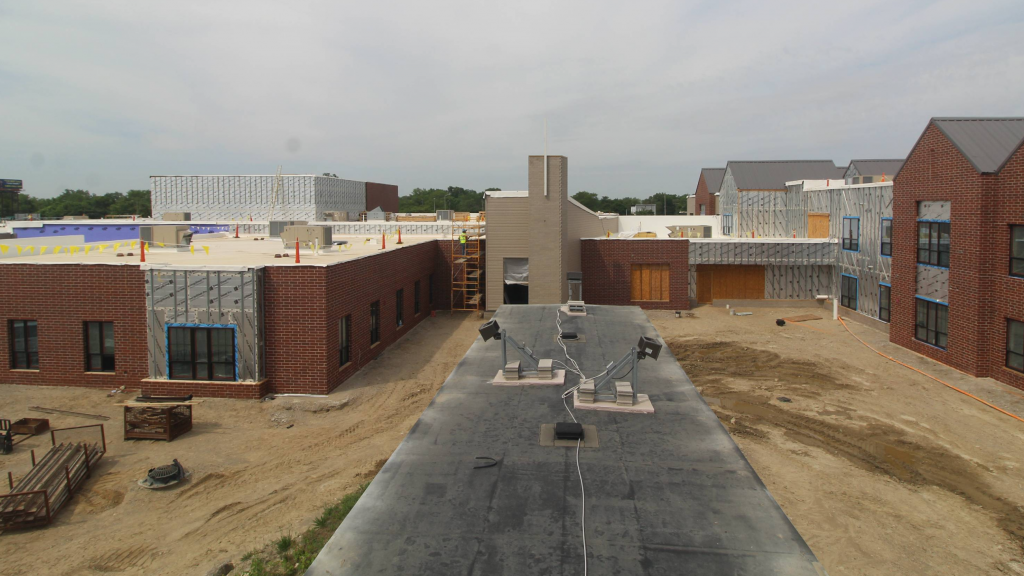The Metro: New Bridge Housing Campus addresses homelessness in Detroit
Sydney Waelchli June 10, 2024The campus will provide up to 120 days of housing and offer medical, psychological, addiction and job-readiness services.

The 40-unit Bridge Housing Campus under construciton in Detroit's Core City neighborhood.
What causes someone to be homeless?
Is it mental health issues? What about lack of job opportunities? Maybe it’s not having enough affordable housing?
Or maybe it’s all of the above.
That’s likely the idea behind the new 40-unit Bridge Housing Campus that’s been under construction in Detroit’s Core City neighborhood. The campus, created by the Pope Francis Center, will provide up to 120 days of housing and offer medical, psychological, addiction and job-readiness services.
Bridge Housing formally opened last week and will begin to house people later this month. Pope Francis Center President and CEO Father Tim McCabe joined The Metro to discuss the new campus and the services being offered
The goal of the Bridge Housing Campus is to help the homeless with transitional housing and with their physical and mental health. People who experience a financial crisis to those who are chronically homeless are welcome to seek the services of the campus.
“We understand homelessness as a result of trauma — so we’re going to provide a trauma-informed care approach, making sure that there’s space to heal from that, understanding the symptoms often are addiction and mental illness,” McCabe said. “And so we’re gonna put professionals around to make sure that they have what they need to heal, and then to move into permanent housing.”
The campus aims to support homeless individuals every step of the way. McCabe expresses that “the hope is that we will walk with them, and they will continue to be part of our community.”
Besides the residential housing, facilities like the gym, health and dental clinics — as well as the different programs and classes offered — are all open to the public.
The community-oriented campus is just one step in expunging the homeless population in Detroit and throughout the country. According to McCabe, chronic homelessness will not end unless the entire community works together.
“We have to continue to see it as a priority. The only thing that’s stopping us around the country in ending homelessness is the will to do what I have been able to do — to really get all of us working together,” McCabe said. “I’ve got the business community, the religious community, the nonprofit sector, the city, the state — all of us kind of working together on this project.
“And that’s what it takes…we have to all be working together. We have to not have silos mentality, but all be looking for solutions and continue to allow the folks that are experiencing homelessness to tell us what they need,” explained McCabe.
Community members are able to volunteer or support the center by visiting the Pope Francis Center’s website.
There is currently a waitlist to stay at the Bridge Housing Campus. However, the Pope Francis Day Center is open to anybody whenever needed. The facility is located at 438 Saint Antoine Street in Detroit and can be contacted by phone at 313-305-0311.
More headlines from The Metro for June 10, 2024:
- Since the height of the COVID-19 pandemic, word has spread that there has been a shortage of nurses in the medical field. But maybe the problem isn’t a lack of nurses, but the working conditions within the medical field. University of Michigan researcher Olga Yakusheva has been working on a new model that would restructure the way hospitals, health insurance companies and the government interact to better support nursing staff. Yakusheva joined The Metro to discuss the model.
- Art around Detroit takes many forms — a popular one being murals. These pieces stretch across a variety of spaces and bring vibrancy to buildings, both old and new. But a recent scandal involving Detroit’s planning and development director has upset some artists who regularly paint these murals. Antoine Bryant is under investigation for multiple alleged ethics violations after executing contracts for mural construction without Detroit City Council’s approval. What exactly did Bryant do wrong? And what might the consequences be both for him and for local artists? To discuss this, BridgeDetroit reporter Malachi Barrett and senior reporter for Outlier Media Aaron Mondry joined The Metro.
